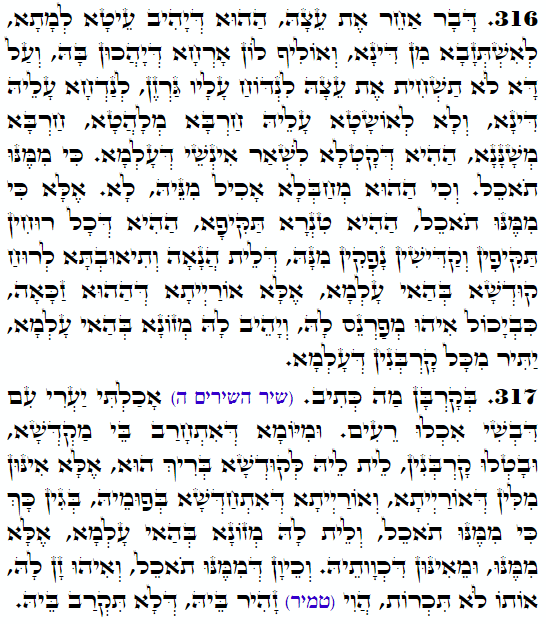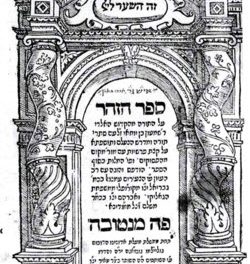Daily Zohar # 3705 – Balak – Are you bearing fruits?
Hebrew translation:
317. בְּקָרְבָּן מַה כָּתוּב? (שיר השירים ה) אָכַלְתִּי יַעְרִי עִם דִּבְשִׁי אִכְלוּ רֵעִים. וּמִיּוֹם שֶׁנֶּחֱרַב בֵּית הַמִּקְדָּשׁ וּבָטְלוּ הַקָּרְבָּנוֹת, אֵין לוֹ לַקָּדוֹשׁ-בָּרוּךְ-הוּא אֶלָּא אוֹתָם דִּבְרֵי תוֹרָה, וְהַתּוֹרָה שֶׁמִּתְחַדֶּשֶׁת בְּפִיו. בִּשְׁבִיל כָּךְ כִּי מִמֶּנּוּ תֹאכֵל, וְאֵין לָהּ מָזוֹן בָּעוֹלָם הַזֶּה אֶלָּא מִמֶּנּוּ וּמֵאוֹתָם שֶׁכְּמוֹתוֹ. וְכֵיוָן שֶׁמִּמֶּנּוּ תֹאכֵל וְהוּא זָן אוֹתָהּ – אֹתוֹ לֹא תִכְרֹת. תִּהְיֶה (טָמִיר) זָהִיר בּוֹ שֶׁלֹּא תִתְקָרֵב אֵלָיו.
.
Zohar Balak
Deuteronomy 20:19
“כִּי תָצוּר אֶל עִיר יָמִים רַבִּים לְהִלָּחֵם עָלֶיהָ לְתָפְשָׂהּ לֹא תַשְׁחִית אֶת עֵצָהּ לִנְדֹּחַ עָלָיו גַּרְזֶן כִּי מִמֶּנּוּ תֹאכֵל וְאֹתוֹ לֹא תִכְרֹת כִּי הָאָדָם עֵץ הַשָּׂדֶה לָבֹא מִפָּנֶיךָ בַּמָּצוֹר.”
“When you besiege a city for many days while making war against it to take it, you shall not destroy its trees by wielding an ax against them; if you can eat of them, do not cut them down to use in the siege, for man is the tree of the field.”
#316
There is another meaning to “את עצה” that translates to “Its tree.” The word “עצה” also means “advice,” referring to a wise scholar who gives advice to the city’s people and teaches them the path to follow and save themselves from the judgment that came to the city.
“you shall not destroy its trees (עצה, advice) by wielding an ax against them” means not to destroy the good advice that pushes away judgment. Also, not to draw on this person a fiery and sharp sword that kills other people in the world.
“כִּי מִמֶּנּוּ תֹאכֵל” “from it you shall eat.” ‘It’ refers to the tree, also, to the advice of the wise scholar. He asks, would the ‘destroyer’ eat from the wise scholar? And he answers, no. ‘It’ refers to the hard rock that all holy and strong spirits come from her, Malchut, in this world. She will eat from it because the holy spirit that is Malchut has no desires in this world but for the Torah of the righteous that sustain her and give her nourishments more than all the offerings in the world.
#317
Songs 5:1
“בָּאתִי לְגַנִּי אֲחֹתִי כַלָּה אָרִיתִי מוֹרִי עִם בְּשָׂמִי אָכַלְתִּי יַעְרִי עִם דִּבְשִׁי שָׁתִיתִי יֵינִי עִם חֲלָבִי אִכְלוּ רֵעִים שְׁתוּ וְשִׁכְרוּ דּוֹדִים.”
“I have come to my garden, my sister, my spouse; I have gathered my myrrh with my spice; I have eaten my honeycomb with my honey; I have drunk my wine with my milk. Eat, O friends! Drink, yes, drink deeply, O beloved ones!”
From the day the Holy Temple was destroyed and the sacrifices stopped, the Holy One Blessed be He, has only the words of Torah with new insights from the mouth of the wise scholars. For that, it is written, “from it, you shall eat.” Because Malchut is nourished from the Torah scholars’ studies, it says “you shall not destroy it,” and be careful not to get close to him.
Lesson;
From the verse above (Deuteronomy 20:19) came out the precept of forbidding the destruction of fruit trees. They represent life energy and nourishments for all, including animals, birds, and many other creatures of Hashem. Rabbi Yehuda Hechasid and other greats said that there is a danger to a person that destroys a fruit tree. Only if a tree is old and stopped producing fruits for a year it can be cut out. If a fruit tree is in a place where they wish to build a dwelling place or cause damages to other trees, then it can be relocated or destroyed. When in doubt, it is better to ask a rabbi that knows the Torah laws.
For the building of the holy temple, Hashem gave specific instructions to use trees that don’t bear fruit.
The first tree planting was made by God in the Garden of Eden, as we read in Genesis 2:8,9
“And YHVH God planted a garden eastward in Eden, and there He put the man whom He had formed.”, “And out of the ground YHVH God made every tree grow that is pleasant to the sight and good for food. The Tree of Life was also in the midst of the garden, and the tree of the knowledge of good and evil.”
{||}

 Previous: Balak
Previous: Balak


